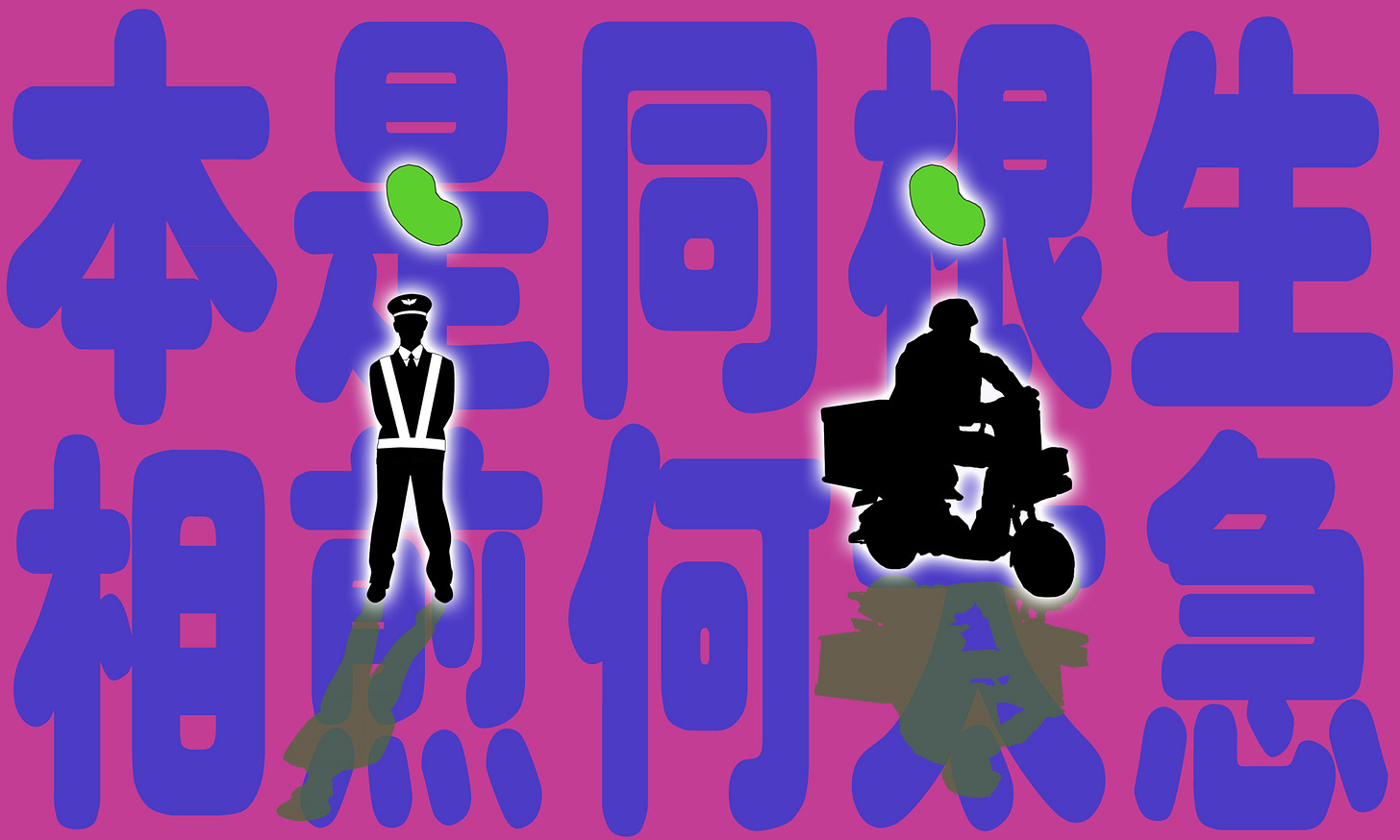Welcome to RealTime Mandarin—a multimedia resource to immerse you in the latest Chinese language trends, inspire you to practice and improve your Mandarin every week, and empower you to communicate with confidence.
Subscribe now to get the next issue straight to your inbox!
On the evening of 5 December at the gates of an apartment compound in the northern city of Qingdao, a dispute broke out between a security guard and a delivery rider.
The 54-year-old security guard, Zhao Li 赵力, challenged the 32-year-old delivery boy, Li Yuekai 李越凯, refusing to let him enter on his motorbike to deliver food to a resident who lived inside.
The altercation quickly escalated.
In less than one minute, the older Zhao produced a knife, and stabbed the younger delivery boy multiple times. Li died at the scene. Zhao was arrested and faces trial for murder.
A native of Jilin province, Li Yuekai only moved to Qingdao one month earlier to help with a relative's travel business. As it was the low season, he took up food delivery as a way to make some money.
Prior to that he attended a university abroad, which cost over a million yuan, funded by his parents.
After returning to China, he eventually had to take any work to repay his debts:
He finally took off Kong Yiji's gown and decided to accept reality and work as a delivery boy, which required no academic qualifications, to help his elderly parents pay off their debts.
最后,他脱下孔乙己的长衫,决定向生活和现实低头,去当根本不需要学历的外卖员,帮年迈还账的父母分忧。[4]
The shocking story of his death is still reverberating in the media and in discussions online.
People are asking: How can this even happen?
One opinion widely shared is:
On the surface, this is a conflict between the security guard and the delivery man.
But behind that is the rival demands and entangled interests of two conflicting systems. The platform economy, represented by food delivery, pursues efficiency and profit; in contrast community governance, the job of the security guard, pursues security and stability.
So the conflict between the delivery man and the security guard is essentially a conflict between commercial needs and community safety. This tragedy of the delivery boy and the security guard made many people sigh, "You are from the same root, so why hurt each other?"
明面上只有保安和外卖员在交锋,但背后是多方诉求的冲突,和剪不断、理还乱的利益纠葛。外卖所代表的平台经济追求高效和利润,而社区治理则追求安全和稳定。所以,外卖员和保安的冲突,本质上是商业逻辑和社区治理逻辑的冲突。发生于外卖员和保安之间的这场悲剧,让不少人发出了“本是同根生,相煎何太急”的感叹。
But there is a similarity too.
Both systems operate on a culture of punishment:
If the security guard is caught letting a rider enter without permission, he will be fined 50 yuan each time. Whereas delivery riders must ensure they deliver on time. If they receive a negative review or order cancellation because they are late, they will be deducted points or even fined. This gives rise to the tension between many community security guards and delivery workers.”
如若保安被发现私放骑手骑车进入,一次会罚款50元。骑手要保证配送的速度,如果因为超时导致被差评或者取消订单,会被扣分甚至罚款。这就是很多小区保安与外卖员起矛盾的原因。[3]
So this tragedy exposes a much deeper contradiction in society:
It’s not so much a case of "people who suffer hardship making it difficult for others who suffer", but rather the exposure of the "plight of the poor".
与其说是“苦命人为难苦命人”的罪证,不如说“穷人困境”的曝光…… [4]
So that’s what we are exploring this week!
Favourite Five
1. 使绊子 shǐ bàn zi
trip up, create obstacles
很多时候,在生活里为难你、给你使绊子的,不是什么一句话能压死人的大人物 - In life it's often not the influential figures with real power that constantly trip you up and create obstacles. [1]
2. 卖力气 mài lì qi
earn a hard living through manual labour
都是卖力气赚些辛苦钱的苦命人 - All are hardworking people who earn a living through manual labor to make ends meet. [1]
3. 百般刁难 bǎi bān diāo nàn
subject to all kinds of harassment
原来真的有一部分人,想骂,想出气,想找点存在感。却不敢对高高在上的人吭个声,只会对比自己更弱势的人,百般刁难 - There are some that want to swear, vent frustration, and seek some recognition. Yet, they don't dare to speak up against those high above, only targeting those even more vulnerable, subjecting them to all kinds of harassment. [1]
Related:
刁难 diāo nàn - harass, give a hard time
4. 同是天涯沦落人 tóng shì tiān yá lún luò rén
fellow wanderers in the same far-off place
同是天涯沦落人,何苦为难苦命人 - Fellow wanderers in the same far-off place, why make life difficult for each other? [1]
More: A six character idiom originally from the Bai Juyi poem 白居易, Song of the Lute Player 琵琶行. This phrase is used to convey a sense of shared experience or empathy between two individuals who face hardship.
5. 本是同根生,相煎何太急 běn shì tóng gēn shēng, xiāng jiān hé tài jí
we are from the same root, why do we hurt each other?
发生于外卖员和保安之间的这场悲剧,让不少人发出了“本是同根生,相煎何太急”的感叹 - This tragedy of the delivery boy and the security guard made many people sigh, "You are from the same root, so why hurt each other?"
Consuming the Conversation
Useful words
6. 为难 wéi nán
make things difficult for someone
他们习惯在最小的权力范围内,最大限度地为难他人 - They are accustomed to making things difficult for others to the greatest extent with the power, however little, that they have. [1]
7. 苦涩 kǔ sè
bitter, astringent
听段子时,只顾着笑,搁进生活里,就咂摸出苦涩 - You laugh at the anecdotes of others, but when that happens to you in real life, you'll taste the bitterness. [1]
8. 何苦 hé kǔ
why go to the trouble
普通人何苦还要再为难普通人 - Why bother making life difficult for ordinary people as you are one of them? [1]
9. 相悖 xiāng bèi
contradictory, in conflict
零工就业体系和社区治理系统的管理逻辑是相悖的 - There is inherent contradiction between how the gig economy is run and how the community governance works. [2]
10. 武断 wǔ duàn
arbitrary, dogmatic
对一个人,或一件事,最武断的做法,就是贴个标签后,一棍子打死 - The most arbitrary approach to an individual or an event is to slap on a label and pass judgment without further consideration. [4]
11. 互害 hù hài
mutual harm
我发现用“互害”的标签去盖戳穷人之间的悲剧,很多时候是对穷人的一种PUA和羞辱 - I've found that using the term "mutual harm" to label tragedies between poor people is often a form of belittlement and humiliation. [4]
Note: Short for 互相伤害.
More: PUA is American slang for pick-up artist. In Chinese, it means “gaslighting” or belittlement.
Three-character phrases
12. 老冤家 lǎo yuān jia
old adversaries, long-standing foes
外卖员与保安是一对“老冤家”,二者在“进与不进”的空间使用问题上冲突了多年 - Delivery workers and security guards are "old adversaries", fighting for many years over the issue of the right to enter certain spaces. [2]
13. 绊脚石 bàn jiǎo shí
obstacle, stumbling block















